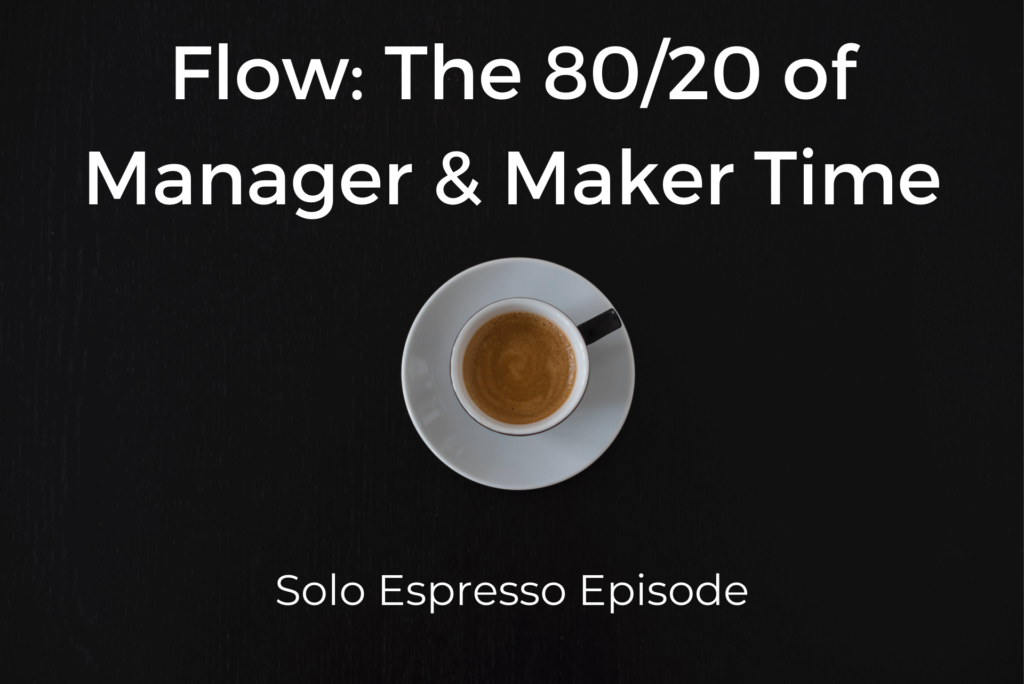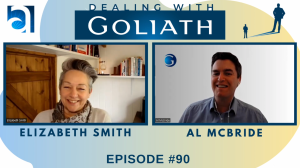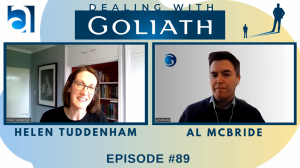Show Notes:
Alistair returns to von Manstein’s Smart and Lazy, but interprets it as smart and focused, from there we venture into an exploration of the 80/20 principle, how it’s connected with hyper productive and creative flow states and it’s lesser cousin.
We dive into the differences between manager and maker time and how it links to the two types of 80/20, and visit the Star Principle and Simplify along the way.
- Not so much smart and lazy, but smart and focused
- The 80/20, deceptively simple yet huge impact
- 80% of your outputs, from just 20% of your inputs
- Richard Koch’s Simplify and Star Principle
- Price simplifers and proposition simplifers
- Gary Keller’s invaluable killer question
- Drucker: “Management is doing things right, leadership is doing the right things”
- Flow from Csikszentmihalyi to Steven Kotler
- Cal Newport and Deep Work
Transcript
Al McBride 0:07
Welcome to the dealing with Goliath podcast. This is a solo espresso episode that I call Flow, the 80/20 of Manager and Maker Time.
Al McBride 0:33
So this is in reference to podcast solo episode I did probably recently might even be the last one. And that was all around this idea. It was from the German General von Manstein, of smart and lazy being the opportune, being the most beneficial state to be in.
Al McBride 0:57
I’m sure a lot of people find that kind of surprising because you think you’re a smart and hardworking would be better but smart and lazy. And as I said, it’s not a bad one to go back and listen to but it was the general idea that I took that as smart and focused.
Al McBride 1:12
So you’re not rushing, doing things grinding through working for the sake of working but taking that zoom out taking bigger picture perspective of what’s most effective and finding that focus given time and space of thought to finding that focus. And this the end of it, I mentioned, the 8020 principle, amongst other things.
Al McBride 1:35
This 8020 I knew many years ago. But of course, it’s popped up as these things do more recently. Most people at this stage has kind of fallen into the popular culture. And it’s a fascinating thing, but I think there’s often subtleties to it that are lost, which is often the case with things that are deceptively simple that people either discard or dismiss it because it’s so obvious.
Al McBride 2:05
So obvious, but people often are doing it. First, I should probably explain what it is. So the 8020 you know, often I hear people, say some they only take an 8020 approach to my diet. And you might say and I remember someone saying this, is it? Oh, that’s very interesting.
Al McBride 2:26
How do you mean, and explain that, Oh, well, 80% of the time eat healthfully and 20% of the time, I just go mad, and I just indulge. And that’s great. You know, it sounds like a good way to do things. But it’s not the 8020 principle, which is now also known as the Pareto principle.
Al McBride 2:46
Now, Pareto, Vilfredo Pareto was an economist, I believe back in the mid to late 1800s. It was Swiss. And he done this research into the Wealth of Nations, at the idea of Adam Smith, I suppose. And I believe he focused initially on was France or Germany and then on to Britain and so on.
Al McBride 3:07
What he noticed this was this amazing what he called a coincidence, or people thought it was a coincidence of time that 80% of the wealth was held or created by just 20% of the people in this, even if the status on equal distribution of wealth is highly controversial.
Al McBride 3:27
To talk about another episode, but getting bit political there. But it is this idea that 80% of your outputs come from just 20% of your inputs, or 80% of your consequences come from what he called the vital few. The vital few factors is just 20% of factors that have the maximum output.
Al McBride 3:54
When you think about it, this I think, although this is relatively new, and it was kind of obscure for many generations, economists knew it a lot of business people knew this. This was I think, was called an issue the Pareto Rule. And then Richard Koch printed this book, the 8020 Principle where he put it into a much broader selection of potential applications.
Al McBride 4:22
So he noticed Well, as I said, Pareto noticed, you know, in his garden that, you know, 80% of the crops of his garden, his little veggie garden herb garden came from 20% of the plants, it wasn’t an even distribution.
Al McBride 4:40
But as I said, Koch expanded that further to noticing that, you know, a lot of anecdotal stuff but also a lot of research in there is quite an interesting book where So talk about how you know, you tend to wear 80% of the time you are just 20% of your clothing, spend 80% of your time if there’s 20% of your friends, there’s a lot of social implications there.
Al McBride 5:06
What was particularly interesting to me? First of all, is that 80 they don’t need to add up to 100. The other little trap a lot of people owe the 8020 9010. Well, yes, but you can, like the internet is a great example of this numbers don’t need out up to 100.
Al McBride 5:28
0.001% of market players of companies can have 98 or 99% of market share this amazing monopoly, particularly in internet the winner takes all type scenario. But Richard Koch said, pointed out some of these things, as did various others after him.
Al McBride 5:54
But it’s very much that this idea of simplifying and Koch really put his money where his mouth is. He’s an investor and venture capital in other areas. And he borrowed I think it was either from Bain consulting, or Boston Consulting, the simple matrix called the star principle. And he has a book called The star principles well worth a look.
Al McBride 6:15
Again, deceptively simple, yet, he applied it to become insanely wealthy, he is sort of worth you know, 400, or half a billion quid or something, I don’t know some insane amount of money. But his success rate is the point is extremely rare and how unusually high a success ratio of of high hitters is.
Al McBride 6:39
He really apply this and he wrote another book called simplified, which was along these lines about proposition versus price simplifiers. These two ways of cutting things back rather than adding more and he gives the example of one examples IKEA, or McDonald’s, which were a great price simplifier.
Al McBride 6:58
A lot of diners from McDonald’s arrived or diners would have 80 or 100 items on the menu, McDonald’s had something like six. So they’re able to, to give a much better price because they have much smaller range. But that tapped into a market need that there was a speed thing that was there.
Al McBride 7:17
Initially, it was only takeaway, which was relatively new. So as a huge, they could give an amazing price at a fraction of the price of even diners, but have focus on on Believe it or not higher quality at the time, that’s what they’re known for. So then the other idea was was the propositions simplifier.
Al McBride 7:38
So Apple is a great proposition simplifier. That’s amazing, easy to use. I mean, a lot of people forget that the iPhone came with virtually no manual. Cast your mind back for those of you who can remember Nokia started this with being almost intuitive, but it still wasn’t quite whereas Apple was so intuitive to you. So natural, spent so much time on design simplification, they took out all these options that most people didn’t need most of the time was this 8020 what are the 20% of things people needed.
Al McBride 8:11
And they made it very intuitive to find those and be able to work those rather than having 100 options that you didn’t bloody need to make things unnecessarily complex. But as I said, Koch really apply this in the simplification, because simplify was born the books and the star principle. And they’re they’re great little reads Sunday afternoon stuff, your blast through them, but some profound effects.
Al McBride 8:39
It links in with Gary Keller’s this one thing idea where he said, What’s the one thing that I can do that by doing this, everything else will be easier or unnecessary? So again, it’s reached into what’s the, the force multiplier was also the phrase I used in that recent blog post on smart and lazy.
Al McBride 9:06
This was a question because I think a lot of people came to it as I did the 20 from Tim Ferriss, four hour workweek. It’s huge. I mean, he credits you know, Richard Koch and the 8020 principles, usually because he ended up in hospital he was working 80 hours, hundred hour weeks, on his I think it was a supplement business or something.
Al McBride 9:27
Then he just couldn’t he had this horrible medical condition wasn’t possible. So we had to focus right down to just 90 minutes a day. And then that was kind of almost a thought experiment challenge for him. How do you just do four hours work a week?
Al McBride 9:43
As explained in another podcast, you know, people chuckle at that. But it really should have been called the four hour grunt work week that the rest of it you’re doing what you want to be doing, adding the most value
Al McBride 10:00
Perry Marshall ran with this. He is a great book the 8020 of sales and marketing, I should say where he talks about it, the 8020 being highly fractal, ie the more, the more you zoom in, or indeed zoom out, the pattern stays pretty much the same, like a coastline you zoom into a coastline. And it’s still the same pattern, same Echo,
Al McBride 10:22
But he talks about this idea of the distribution that is the 8020 of the 8020, which is known as the 4% rule. And he talks about this distribution that in certain situations he mentioned in a football stadium in the States.
Al McBride 10:40
They worked out this that if if the mass majority of the fans are willing to pay a certain price, standard price for each ticket or for a season ticket, then 4% of that or less the 4% of 4%, you know, though just a few individuals would be able to be prepared to spend literally 20 to $200,000, again, for that Uber exquisite box.
Al McBride 11:09
They’re able to sell everything in between those different rates and how many people roughly will buy them if you know you know what, people at one end were buying maybe or people at another end or buy, you can work at that distribution. So it’s also a call to when you’re designing your services to offer something for mass consumption at a low price and then the equivalent if you’re only doing one or the other, then something highly rare for a very much much higher price.
Al McBride 11:40
It’s fascinating stuff as I say. But this I was listening to an interviews what reminded me with Tim Ferriss of all people I don’t listen to his podcast that much anymore but some interesting but I saw he had Richard cash on so at all this could be interesting. And Koch said quite a few interesting things.
Al McBride 12:00
But one of them in particular, was he linked 80/20 with flow. And it seems completely obvious when he said it. But I hadn’t quite put the two together before because big fan of flow state research Steven Kotler in particular, one of the leading lights in that with the flow state genome project, and he wrote the rise of Superman he wrote stealing fire.
Al McBride 12:28
Just some remarkable books about flow research and how it’s really is the cutting edge, about this hyper creativity, hyper productivity that humans can achieve, when in state of flow. And this building on the back of Csikszentmihalyi I think his name is nobody can quite pronounce it because he was sort of the, from the university Chicago, where he wrote the book Flow, did that initial research in the 60s 70s, and 80s.
Al McBride 12:55
But a lot of this is then built on the back of all Csikszentmihalyi work. McKinsey backed it up with a study where certain executives that managed to attain more flow states, they literally are 500% more productive than their colleagues.
Al McBride 13:18
So it was a part of research of what you know, C suite executives who get ahead who rise what were they doing to get to c suite what were they doing, once they were at that high level to make CEO or to make whatever it is that there was their goal, and often is this magnitude of output more than their than their counterparts.
Al McBride 13:42
DARPA, the the military research group, in the United States, they work with, with Steven Kotler quite a lot on flow states and how snipers trained in flow learning, think of something ridiculous, like a quarter of the time up to the same level of their peers, their improvement is the same but it’s it’s much much faster when they’re in an induced flow state. So it’s a huge thing. #
Al McBride 14:11
But this got me thinking about the 8020 and work output. Because like when you’re in a get totally I think most people get that intuitive thing that we’re in this does real flow states where you lose track of time where you’re in fast feedback loops, we have clear goal in mind where you as I said, an fast feedback you’re able to adjust all the time, your course and learn and it’s right up there in that challenge part of the brain where you’re 4% more they say 4% more than your ability so you’re right on the edge of what you think you’re capable of.
Al McBride 14:44
And afterward you know, you don’t feel burn up you feel kind of tired but fulfilled all that sort of stuff is usually has purpose connected underneath it. I must do more episodes in and around flow stage but what what occurred to me and tied in with I had this opportunity to go see this art show that I wanted to see in the history show there the other day.
Al McBride 15:06
But I had to finish work much earlier than I’d planned. And it was this thought that hold on. If I only had 90 the Tim Ferriss thing, if I only had 90 minutes a day to do a full workday, what would you do?
Al McBride 15:20
It’s not a bad way to start planning. It really cuts away a lot of the nice to have and has the absolute need to have that core 20%. I’m not saying that you need to do that the whole day, like just work 90 minutes, but it doesn’t make sure that you get the most important things done, which I’ve been getting better at again.
Al McBride 15:41
But as Peter Drucker said, he said, management is doing things right, leadership is doing the right things. Again, that’s where they have a podcast on its own, isn’t it? But it did get me thinking that, you know, he’s talking about leadership level 80/20 flow activities.
Al McBride 16:02
For me, the whole lot of it. That’s that’s the thinking. So you know, think of it in terms of self management versus self leadership. Self leadership is this big grand vision of where we’re going what we’re building great grand vision of our output and creative endeavors.
Al McBride 16:22
That’s where the the 8020 maker time is because there’s maker time and manager time, which can probably be another topic right there. And I know that when managers are managing creative people, they have to do this, to be acutely aware of where they schedule meetings, because if it’s right in the middle of their maker time, they can disrupt a person’s flow work output for the whole day can be ruined.
Al McBride 16:50
If it’s right at the start, or at the end of the day, and it doesn’t interfere as much and it can be it can actually help creative people or I want to say creative people, I don’t talk just make painters or writers talk about coders, I talk about anyone who has to make a creative endeavor who needs to go deep.
Al McBride 17:06
Deep work a whole other podcast there about Cal Newport’s work and how it fits in. But is this maker versus manager time. And I think an awful lot of flow is all about maker time. And rightly so that’s where the major leaps in progress are, just as we said in this Uber productivity to 500%, which means basically your turn up for work on Monday, do it in a hardcore flow state.
Al McBride 17:32
And if you do nothing else for the rest of week, you’re the same output as the average. That’s nuts that’s absolutely nuts. And that’s brilliant. But I think there’s an oft forgotten area where there’s that, that 8020 that of manager time that you’re doing the things that matter that you’re doing that, but you’re not in a flow state.
Al McBride 17:56
But I think it’s still hugely valuable because it clears the decks for you to do that key core work in those flow states. But often people don’t get into them. I know, a number of friends and clients who the flow state they get into is almost by accident. It’s not by design.
Al McBride 18:14
I had designed a course I have never I never really gave it in its entirety. But I just gave bits of it around this exact issue about clearing the decks. And clearing the decks is about that at 20 of manager time, that low level or managing small light flow.
Al McBride 18:30
It’s almost the admin of us, you know, what are the key things I need to do the key emails, you need to reply to the key ideas that you need to get clear in your head to send back to be the most effective in that messaging rather than just playing email, ping pong or same with your diary?
Al McBride 18:47
What are the few things in your calendar that need to be there to make sure you get on what absolutely drives you forward. And once again, it goes back to that idea from the smart but lazy, which is about focus that stepping back not just trying to be this paradigm of being busy, but actually getting the right things done. I think that continually is the theme that I’m coming back to and don’t get me wrong look. It’s easier said than done.
Al McBride 19:18
I still struggling with this whole time as is that this is where these thoughts come from as me trying to work these things out for myself. And also so that I have it’s better than doing a journal entry some of these podcasts you know, so
Al McBride 19:30
that I can go back to it and weeks or months or hopefully years even to come and go What the hell was the point I made there? Oh, yes. 80/20 of manager time, what’s crucial, what’s key what moves the alarm, reflect on at the end of the week? What can you do better?
Al McBride 19:46
Did that actually work? Did it not? Well, did it work? Well, can we improve for next week? All to clear the decks so that you have more and more that 8020 time that flow time to go into those states where you deliver the best work in your best self?
Al McBride 20:04
That’s what I’m usually trying to do for myself and increasingly with clients. I think it’s a central thread of what I care about deeply of what I want to stand for what I want other people to, to find and discover and hone within themselves. So yeah, two types of flow. Often not so much talked about smart and lazy. Stand back Zoom out to work out what really matters.
Transcribed by https://otter.ai
Resources
- The Tao of Wealth [Blog Article]: How the Star Principle Can Make You Rich
- Robdix.com [Article]: Summary: The Star Principle by Richard Koch
- Francis Miller [Article]: The Summary of Simplify by Richard Koch
- Wikipedia: Mihaly Csikszentmihalyi
- Goliath Blog/Podcast: Smart & Lazy to Sharpen the Axe #022 [80/20 principle, von Manstein’s 4 Types of Soldier]





This Post Has One Comment
Pingback: Smart & Lazy to Sharpen the Axe (Dealing with Goliath Podcast #021) - Alistair McBride
Comments are closed.